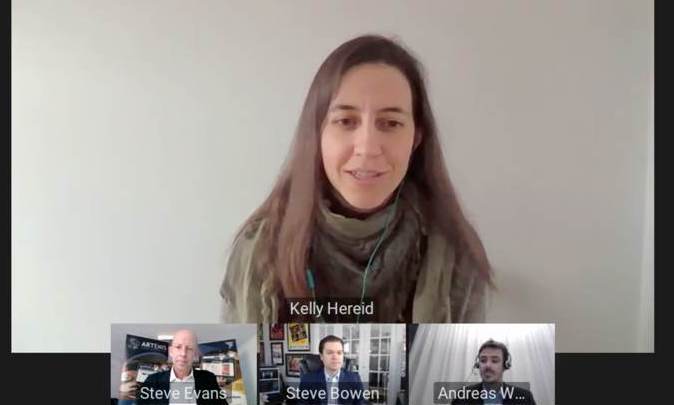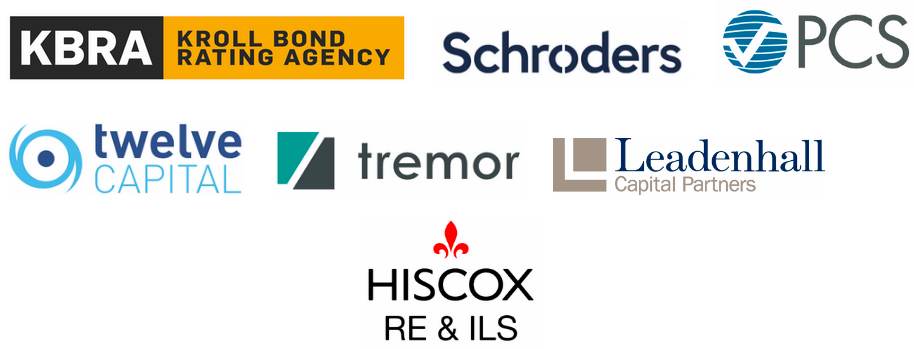As vendor catastrophe models and elevated annual losses show that secondary perils have grown in prevalence for the re/insurance and insurance-linked securities (ILS) markets, climate risk needs to be explicitly baked in, according to Kelly Hereid, Director, Catastrophe Research & Development, Liberty Mutual Insurance.
 On day four of Prospectus 2021, the audience was treated to an expert debate and discussion on secondary perils by Liberty Mutual’s Hereid, alongside Steve Bowen, Director & Meteorologist, Head of Catastrophe Insight, Aon and Andreas Weigel, Weather Perils Lead at Swiss Re.
On day four of Prospectus 2021, the audience was treated to an expert debate and discussion on secondary perils by Liberty Mutual’s Hereid, alongside Steve Bowen, Director & Meteorologist, Head of Catastrophe Insight, Aon and Andreas Weigel, Weather Perils Lead at Swiss Re.
Throughout the session, 2011 and 2017 were highlighted as watershed moments for secondary perils, as record-breaking losses from severe convective storms and later wildfires, saw these so called secondary perils increasingly contribute to total, annual re/insurance industry losses.
Although Covid-19 has taken centre stage in 2020, climate change remains one of, if not the greatest challenge facing the planet on both a macro and micro level. Unsurprisingly, the topic of climate change is often raised in discussions around the catastrophe risk space, and Prospectus 2021 was no exception.
“I think it’s important to note that we need to be explicitly baking in climate risk, where we have the level of confidence to be able to do that,” said Hereid.
“A good example of this, and we’ve talked a lot about some of the big secondary perils, but there are secondary perils that are tacked on to our primary ones, like storm surge,” she continued. “To me, sea level rise and storm surge are as cut and dried in the climate case as you can make.
“Our vendor models incorporate currency levels, but we should be taking a forward looking view of how future sea levels will impact storm surge, and that is a no brainer that we should be doing in our industry right now.”
Her comments raise an interesting point for the ILS market and especially the catastrophe bond sector, where, new deals often come to market with information for investors modelled based on normal / warm sea surface temperature scenarios, but not yet with scenarios that encompass future sea level rises.
“At the end of the day, it’s enough to say we can come on and off of our business on one-year timescales, but that’s not a very good way to endear yourself to your customers.
“It’s a lot better, from a business perspective, to be able to say ‘we are comfortable with the level of risk that we are taking today and looking forward into the future, and we will be there for you in the future as this risk continues to change.’ So, we need to get right with what that risk is going to look like now and 10 years from now,” said Hereid.
Continuing the conversation, Bowen noted Aon’s recent collaboration with Columbia University; a multi-phase project centred around climate change and tropical cyclone modelling designed to identify scenario-based climate assumptions.
“I know that the main question that we’re getting from clients right now, is how are you integrating climate risk into these different types of modelling? And, trying to identify that delta between the current base environment, towards what we expect could be happening say five, 10, 15, 20 years down the line, which obviously our industry is most interested in in the near-term,” said Bowen.
Adding, “So, I think, just using Aon as an example, I think that we’re starting to see more and more of these collaborations with academic institutions, which are the ones that are producing the peer reviewed science that I think most people can generally accept.
“The way I’ve seen this phrased by some climate scientists is, ‘we have to start assuming that 2020 is the warmest year on record.’ I think, we need to start thinking 2020 is the coolest year we’re going to see for X number of years in the future. Because, it’s almost like compounded interest in a way, where we’re just continuing to add more heat into the atmosphere, which is in turn leading to more shifts in terms of the ocean and how it’s behaving and is rising.
“There’s more heat and more moisture in the atmosphere and that’s leading to more of these unusual weather patterns. So, I think we’re starting to see some steps being taken but uncertainty is always the main word that we’re dealing with.”
According to Swiss Re’s Weigel, the most important thing is the high relevance of close collaboration with the academic community to ensure the latest science is getting into decision systems.
“That cannot be overestimated, I think this is fundamental. This is also what we, as a big reinsurer have been valuing very highly. Apart from having our own in-house experts, a relatively fairly big team, looking at really how can we include climate change signals, but also other macro trends into our risk views. And, as I said, I think integrating this forward looking view is absolutely key if you want to be a sustainable business model,” explained Weigel.
“Also, looking backwards and reassessing what happened in the past is one of the very important components that we are doing. Because whatever model you do, you will always somehow benchmark it against historic events that have happened. And, then the question is okay, if that historic event would happen now, how strong would it be?
“I’m not so much talking about the climate aspect but really more on this exposure part. Essentially, systematically understanding what are the consequences of urbanisation trends, what are the consequences of claims inflation trends, of social behaviour, of insurance conditions,” he continued.
To watch every session on-demand please visit the Prospectus 2021 website.
Thank you to our Prospectus 2021 sponsors:
Please contact us for more details on sponsorship opportunities at future events.
 View all of our Artemis Live video interviews and subscribe to our podcast.
View all of our Artemis Live video interviews and subscribe to our podcast.
All of our Artemis Live insurance-linked securities (ILS), catastrophe bonds and reinsurance video content and video interviews can be accessed online.
Our Artemis Live podcast can be subscribed to using the typical podcast services providers, including Apple, Google, Spotify and more.
































